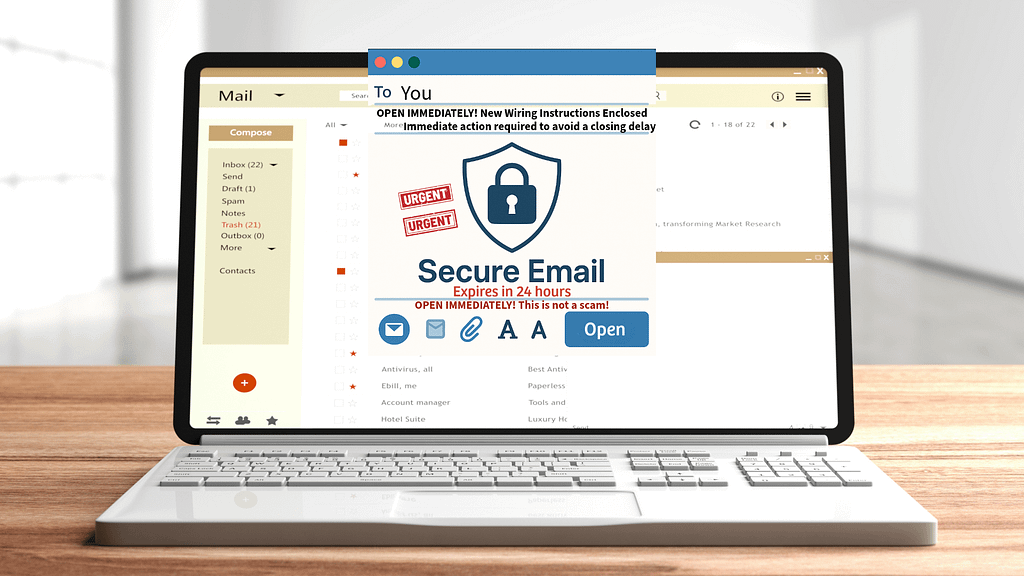
Wired to the Wrong Place
The truth is, there are many different F words, but the one I want to shine a light on today is fraud: specifically, wire fraud that’s about to steal your dream home right out from under you.
Picture this: You’re weeks from closing on your dream home. The inspection survived. The appraisal came back clean. You’ve already measured that perfect couch for the sunny corner. Life is good.
Then ping an email lands with “FINAL WIRING INSTRUCTIONS.”
It looks right. It sounds right. It’s exactly what you were expecting, because someone has been reading over your digital shoulder the whole time.
Creepy? Absolutely. But here’s what’s even creepier: they knew you were buying a house before you even found the perfect place.
👀The Watchers: How They Hunt You Down
Mortgage and real estate wire fraud doesn’t happen by accident. These criminals aren’t casting wide nets and hoping for the best. They’ve mapped the home-buying journey better than most first-time buyers, and they strike at the exact moment your guard drops.
Here’s the disturbing truth: Scammers don’t pick victims randomly. They hunt them.
🧩The Predictable Patterns They Exploit
Real estate transactions follow the same playbook almost every time. Crooks know it cold:
The Signal Flare: Pre-approvals, listing saves, agent outreach, and loan applications. Each step shouts to anyone listening, “A big wire transfer is coming.”
The Timeline: Once you sign that purchase agreement, there’s a predictable 30-45 day runway to closing. That’s plenty of time to surveil inboxes and plant their trap at the finish line.
The Sweet Spot: Wire transfers typically move 24-48 hours before closing. This isn’t a guess. It’s a pattern they’ve exploited thousands of times.
The Jackpot: Down payments and closing costs often range from $20,000 to $200,000+. Rich enough to justify elaborate, months-long setups.
The Digital Spies in Your Inbox
Remember that uneasy feeling when someone knows too much about you? That’s exactly what’s happening here.
Fraudsters don’t guess your next move; they watch it unfold in real-time.
Their favorite targets:
- Real estate agents (access to multiple deals)
- Title and settlement company staff (the money handlers)
- Mortgage loan officers (timeline intel)
- Real estate attorneys (final wire details)
Once they breach a mailbox, they become digital ghosts:
- Create silent auto-forwarding rules so copies of every message flow to them
- Shadow email threads to learn closing dates, wire amounts, property addresses, and everyone involved
- Study your communication style to perfect their impersonation
How do they get in? Their tactics are depressingly simple:
- Phishing emails that harvest login credentials
- Exploiting password reuse and weak passwords
- Social engineering: “Hi, IT here. We need your verification code for a security update.”
- SIM swaps to intercept those “secure” text message codes
From this insider perch, they wait. And wait. Then they pounce.
The Perfect Crime: Timing Is Everything
Here comes the masterpiece, a pixel-perfect email that arrives 1-2 days before closing, appearing to come from your trusted title company.
Real domain: nationaltitle.com
Fake domain: nationa1title.com (That’s a numeral 1, not a lowercase L)
The message references your exact property address, closing date, and dollar amount because they stole those details upstream. Then comes the psychological pressure:
- “Wire must be received today or closing will be delayed”
- “Updated banking information due to recent fraud concerns” (The irony is noted)
- “Final instructions: disregard all previous details”
By closing week, you’re running on pure adrenaline and caffeine: documents, inspectors, loan conditions, movers, life. Your brain just wants to finish, not question every detail.
Scammers weaponize your exhaustion:
- Time pressure from impossible deadlines
- Emotional investment in “the one”
- Normalization of large numbers after weeks of talking in tens of thousands
- High trust in familiar names and email signatures you’ve seen dozens of times
So when that look-alike email arrives, it doesn’t trip any alarms. It feels like just another checkbox on your endless to-do list.
Gut check: Do you feel rushed, cornered, or have that vague uneasiness creeping up your spine? That’s your internal fraud radar. Trust it before your wire takes a one-way trip to nowhere.
Your Digital Breadcrumb Trail
Every single click on a real estate site kicks off a silent parade of trackers. Those “free” mortgage calculators and property alerts? They’re not free. You’re the product.
👀The Watchers Are Always Watching
When you browse Zillow, Realtor.com, Redfin, or use lender calculators, invisible tracking pixels collect:
- Your device fingerprint and browser details
- Time spent drooling over specific listings
- IP-based location signals
- Your entire search history and preferences
- Patterns that scream “about to spend big money”
Data brokers stitch this into detailed profiles tagged “actively shopping for a home.” Advertisers buy these profiles. Sometimes scammers do too, or they breach a vendor and help themselves to the data buffet.
Either way, the result is the same: Complete strangers now know you’re about to move serious money.
🎯When Targeted Ads Become Targeted Traps
Once you’re labeled as a buyer, your social feeds fill with mortgage ads, title services, and insurance offers. Most are legitimate. Some are professional-grade impostors designed to harvest your information.
Click the wrong ad and land on a cloned site offering:
- “Instant pre-approval!” (Harvests your income and Social Security number)
- “Free closing cost calculator!” (Collects property details and contact info)
- “Trusted title services!” (Phishes for closing timelines)
The Art of Almost-Right Domain Names
Look-alike domains are a scammer’s love language:
- SafeTitle.com → SafeTitIe.com (Uppercase i masquerading as lowercase L)
- mytitlecompany.com → mytitiecompany.com (Sneaky letter swap)
- secure-title.com → securetitle-docs.com (Extra hyphen throws you off)
Type your information into those forms, and congratulations: you’ve just handed criminals:
- Personal identifiers for full-scale identity theft
- Financial data for account takeover attacks
- Contact details for targeted calls and emails
- Property and closing details to perfectly time their wire scam
Your Fraud-Fighting Game Plan
Fraud doesn’t take a day off, and neither should your awareness. Here’s your step-by-step battle plan to keep your cash out of a criminal’s pocket.
Before You’re Even Under Contract (Yes, Start This Early)
Set up your secret code phrase with your agent and title team. Something like “The Truth About the F Word.” When they call you about wiring or changes, they must provide this code phrase first. If they can’t give you the correct code phrase? No money moves.
Lock down your email like Fort Knox:
- Turn on app-based multi-factor authentication (never SMS-only)
- Use a unique, complex password
- Check for suspicious forwarding rules now, then again the week of closing
Get your title company’s wiring policy in writing at the very start. Many will explicitly state they never change wire instructions via email.
Collect verified phone numbers from business cards or official websites. Never trust phone numbers from email signatures.
When Wire Instructions First Surface
Demand a secure portal with multi-factor authentication for all documents and instructions. If email is unavoidable, require verbal verification for everything.
Don’t trust PDFs just because they look official. They’re ridiculously easy to fake with the right software.
Verify every single banking detail over a phone call you initiate to a number you independently verified:
“Hi, this is [Your Name]. I’m calling the main number listed on your website. Can you transfer me to settlement? I need to verify wire instructions line by line. Before we start, can you please provide our agreed-upon code phrase? Perfect. Now let’s go through the routing number, account number, beneficiary name, and address.”
The Day You Send the Wire
Call again separately to reconfirm every detail before hitting send. Ask them to provide the code phrase first, then verify all details.
Send a small test amount first if your timeline allows. Confirm receipt by phone before sending the full amount.
Screenshot everything: final instructions, your bank’s confirmation screen, transaction numbers.
Immediately After Sending
Call the title company right away to confirm receipt. Don’t wait for an email confirmation; make that phone call.
If they don’t see the funds within expected timeframes, escalate immediately. Every minute counts.
💸If Your Money Is Already Moving
Speed is everything when money is flying through the banking system. But you can move fast too.
- Call your bank’s wire department immediately. Request a wire recall or freeze. Ask them to contact the receiving bank’s fraud team through their direct hotline.
- Alert your title company using your verified phone number. Tell all parties to halt closing until funds are located.
- File reports immediately: FBI’s Internet Crime Complaint Center (IC3) and local police. Get report numbers for your bank.
- Notify everyone in your transaction: lender, real estate agent, and insurance company. Document everything for potential claims.
- Lock down your identity: Credit freezes, fraud alerts, password changes on every account mentioned in email threads. For a quick guide on where to report fraud, visit The Truth About the F Word’s resource page.
Treat the first 24 hours like a rescue mission. That’s your best window for recovery.
🕵️♂️Spotting the Fakes: Your Email Detective Skills
Hover, don’t hurry. Your cursor is wiser than your click finger. Hover over sender addresses. They should match the real domain exactly.
Watch for sneaky substitutions: ‘rn’ can look like ‘m’ in some fonts. Same with l/1, O/0, and .co versus .com.
New domain smell: If the “office” supposedly moved to a .co domain yesterday, make that verification call first.
Language tells: Urgency plus secrecy (“Don’t call: we changed banks due to fraud”) equals classic scam combo.
Attachment tricks: Legitimate title companies don’t send password-protected PDFs that conveniently contain “updated” account numbers.
🚩Red Flag Lightning Round
Stop everything if you see:
- Last-minute account change emails
- Pressure to send money “today or risk closing delays”
- “Updated due to fraud concerns” (The irony is real)
- New beneficiary names or out-of-state banks you’ve never heard of
- Instructions saying “Do not call” or providing new phone numbers
The 10-Second Gut Check
Before sending any wire transfer, run through this mental checklist:
- ✅ Did I initiate the call to a verified number?
- ✅ Did we use our secret code phrase?
- ✅ Did I verify every number out loud?
- ✅ Does this feel rushed or “off” somehow?
If any box stays unchecked, stop. Your money can wait. Scammers can’t.
Trust Your Gut Before Your Wallet Takes the Hit
Buying a home is stressful enough without criminals trying to steal your closing funds. But here’s the thing about that uneasy feeling creeping up your spine when something doesn’t feel quite right: that’s your intuition screaming at you to back away, fast.
The only F word we’re not saying around here? Fooled.
Your fraud radar is more sophisticated than any software. When it starts buzzing, listen to it. That slight hesitation, that moment of doubt, that feeling of being rushed, these aren’t paranoia. They’re your brain recognizing patterns that don’t add up.
Scammers count on you ignoring those warning signs. Don’t give them the satisfaction.
Have a fraud story or suspicious message lurking in your inbox? Help us flip on the lights so someone else doesn’t learn the hard way.
📬 Send your experiences to: tips@thetruthaboutthefword.com
The more we share, the fewer people get scammed. And that’s an F word we can all get behind: fraud-free.
Want more fraud-fighting intel delivered straight to your inbox? Subscribe to The Truth About the F Word and join people who refuse to become victims.

Leave a Reply
You must be logged in to post a comment.